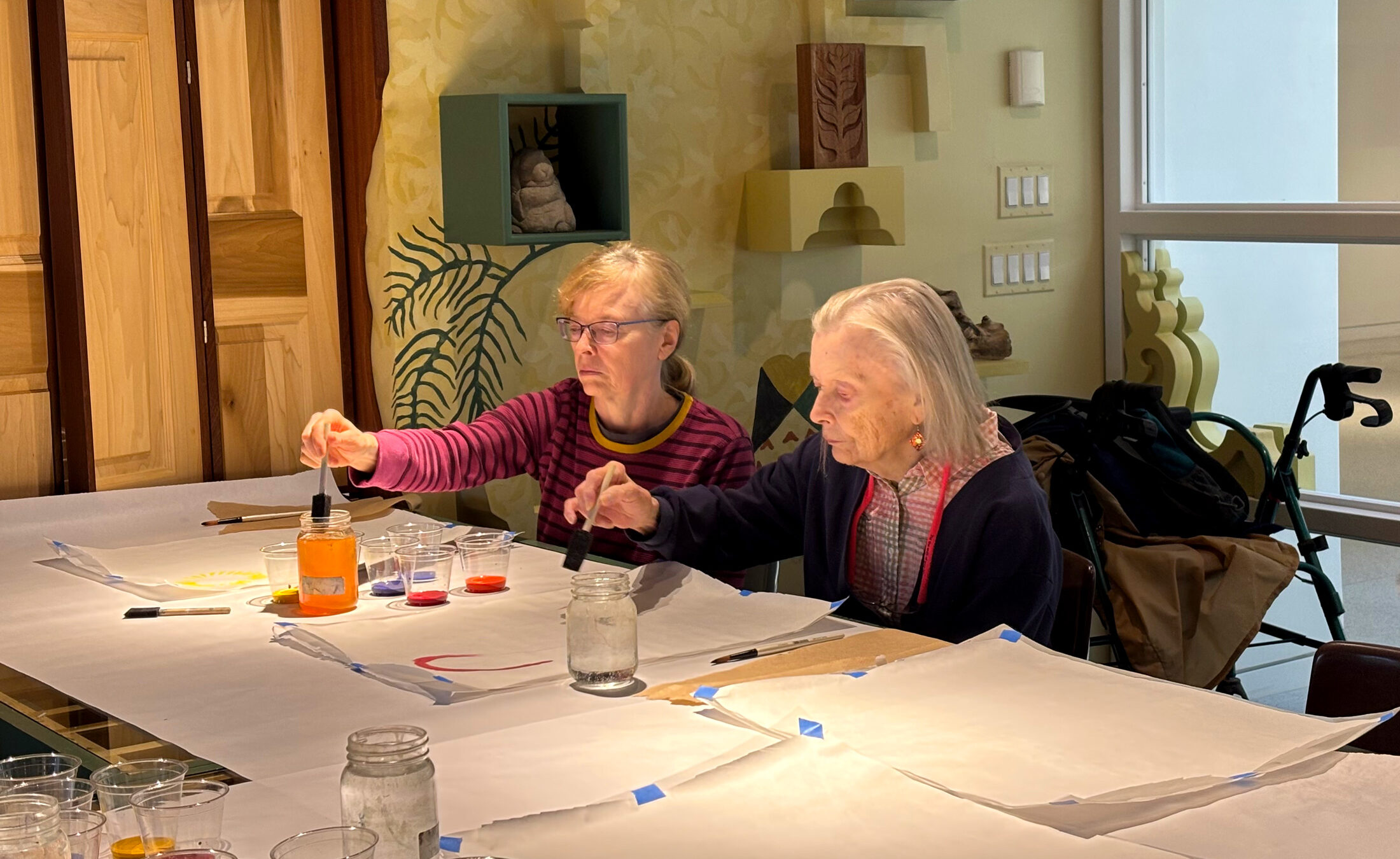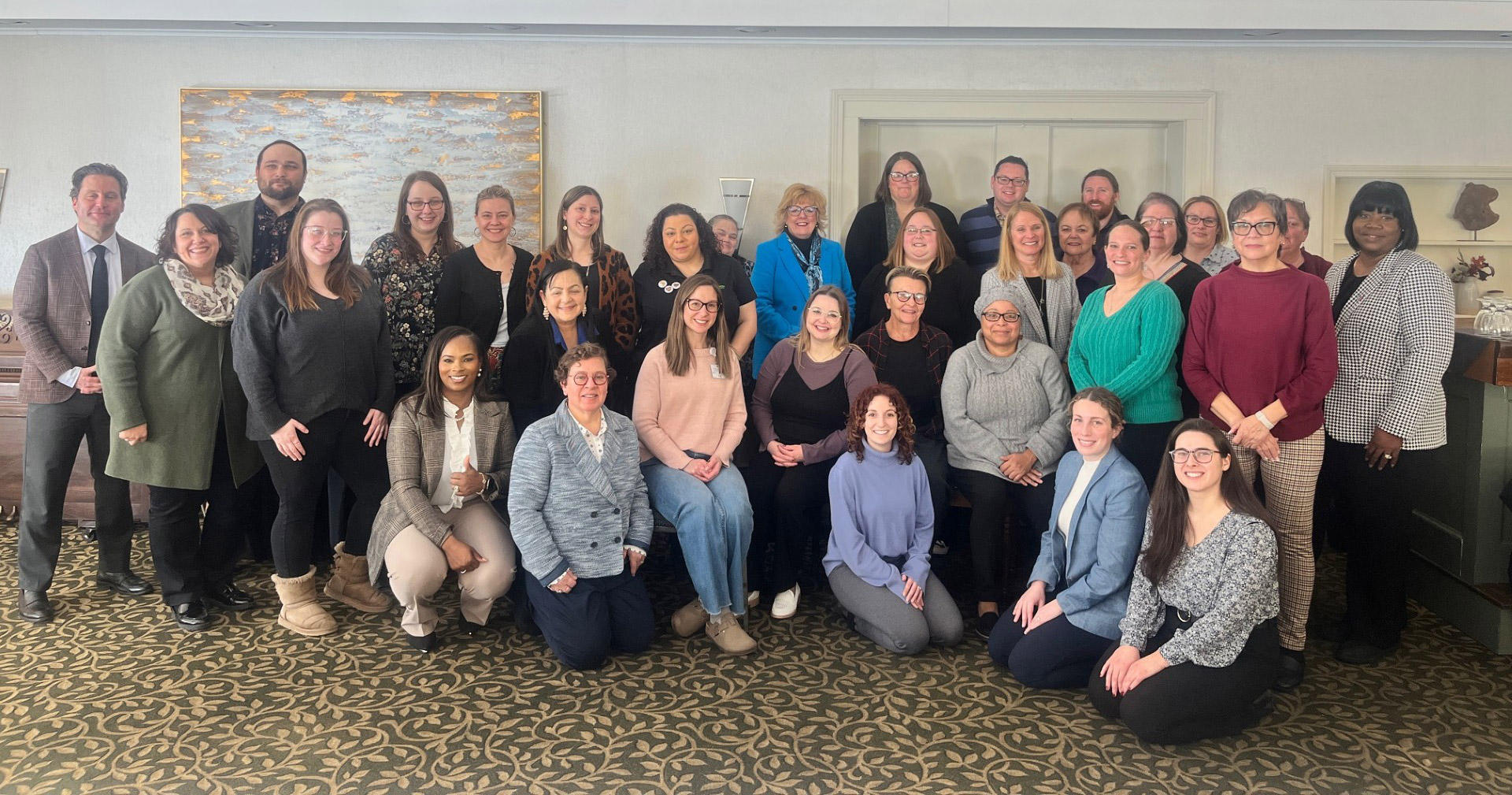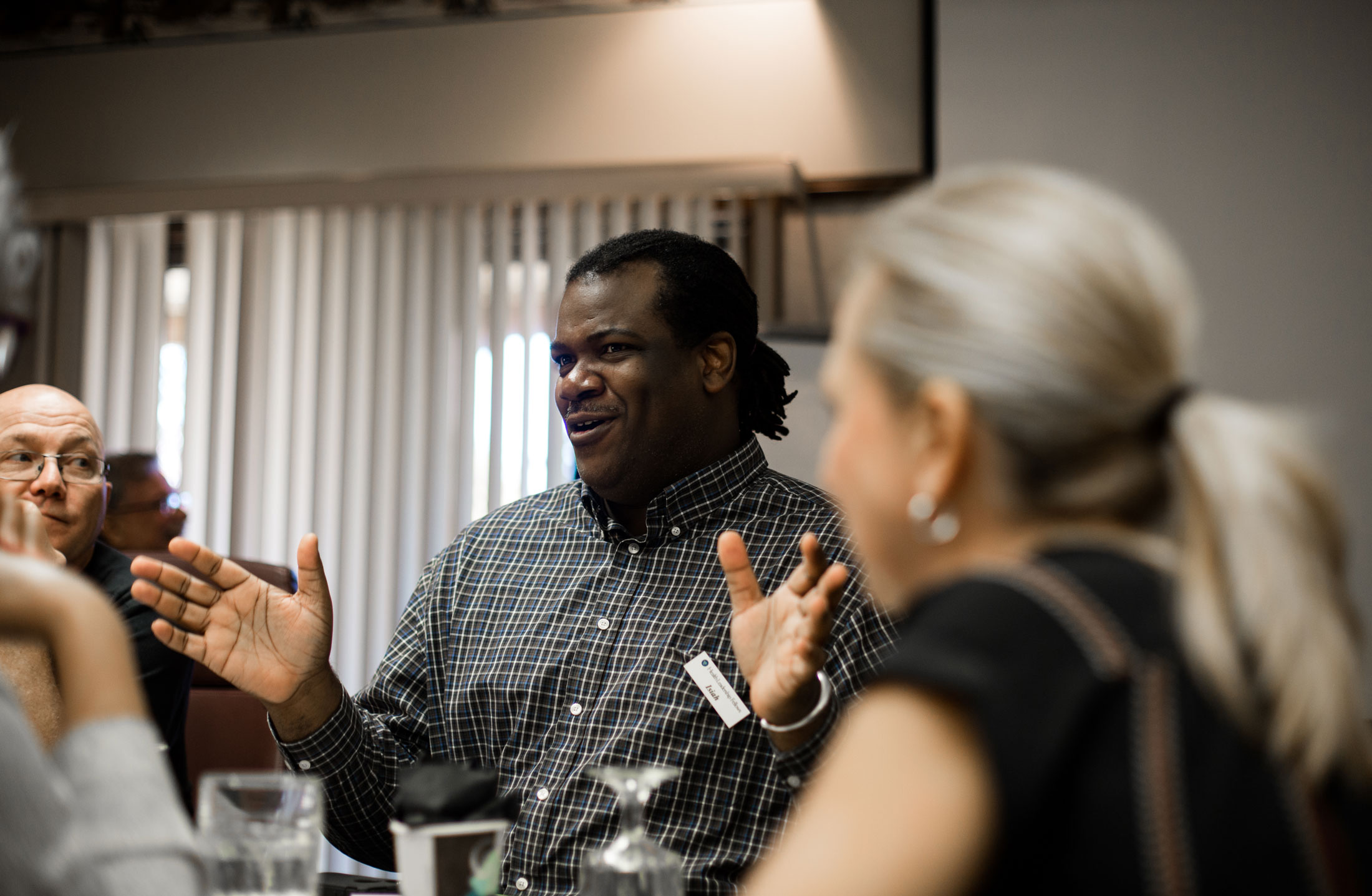2024 Annual Report
Spotlight on the Memory Café Collective:
Finding Joy Through Connection and Respite
The first memory cafés appeared in the late 1990s and were the brainchild of Bere Miesen, a Dutch geriatric psychologist who recognized the therapeutic effect of music on those living with Alzheimer’s disease and dementia. The idea eventually spread to the United States, and today memory cafés can be found throughout the country, including western New York. With the anticipated increase in Alzheimer’s and dementia diagnoses, memory cafés are a unique and vital resource. They provide not only a supportive space for older adults with memory loss but also essential respite for caregivers.
Every 65 seconds, someone in the United States develops Alzheimer’s disease.
Source: Fischer Center for Alzheimer’s Research Foundation

Exhale, The Family Caregiver Initiative
In 2023, the Ralph C. Wilson Foundation and the Health Foundation identified candidates for a new cohort of memory cafés through Exhale, The Family Caregiver Initiative. In western New York, 11 nonprofit groups were chosen to participate in Exhale’s Memory Café Collective, organized around the theme of arts and culture. While several grantee-partners are still in the discovery and planning stage, a few of these new memory cafés are already up and running. Here’s a closer look at three of them.


Where the Art Is: The Burchfield Penney Art Center
At 10 a.m. on the first Wednesday of every month, the doors open at the Burchfield Penney Art Center, located in the Elmwood Village neighborhood of Buffalo. Kathy Gaye Shiroki, Manager of University and Adult Programs, stands at the main entrance, eager to welcome caregivers and their loved ones to the museum’s memory café. Her goal is to put everyone at ease and make the café as inviting and accessible as possible.
The first stop is the museum gallery, where a docent leads caregivers and their loved ones in an art appreciation discussion of selected works. It’s an intimate and deeply reflective activity that allows the group to linger over a certain piece of art and say whatever is on their minds. Sometimes the art triggers a special memory.
Even so, Kathy explains that the respite program downplays identifying who has cognitive decline and who does the caregiving. Instead, the memory café strives to be an equalizing space where every attendee can take a break from the world outside the museum walls and simply bask in art’s ability to soothe and inspire.
“This is a time to continue to be respectful and intellectual while we’re having conversations in the gallery or working with our hands,” she adds.
After the gallery visit, everyone heads to the studio, where a docent has prepared art supplies for the morning activity. The activity is inspired by the artwork from the exhibition. Caregivers and their loved ones take a seat and begin creating.
“I really love the joy that comes out of this experience—whether that’s the kind of joy the caregiver feels, or the joy experienced by the person with memory loss.”
Kathy Gaye Shiroki, Manager of University and Adult Programs, Burchfield Penney Art Center
One caregiver is there with her husband. She sits across from him as they play with the different colors of paint. The Burchfield’s memory café is one of many resources they take advantage of—including other memory cafés and museums. “We want to make every day the best day,” the wife smiles. Another caregiver and her mother sit side by side at a different table. Deep in thought, they each dip their brush into the paint and move it across the paper, creating colorful swirls.
The memory café’s quietly relaxed atmosphere is intentional. Kathy says, “It’s wonderful how much people settle in and just enjoy being here.” The Exhale training helped her understand a lot of the subtleties needed to interact with people living with memory loss. This includes making sure attendees know exactly where the restrooms are, as well as being mindful when asking any direct questions. “Don’t ask what someone had for breakfast, for instance, because they may not remember.” Staying in the moment and literally meeting people where they are—that’s a guiding principle at the café.
What matters most is being flexible, respectful, and inclusive—creating an environment that reassures exhausted caregivers and their loved ones that they can set aside their burdens, and let the art carry them away for a while.



Cultural Connections at Café Del Sol
The name Café Del Sol, which translates into English as Café of the Sun, takes its inspiration from the light. “We wanted it to be a name that opens up opportunities, not dwell on the memory impairment aspect,” says Casimiro Rodriguez, President of the Hispanic Heritage Council of Western New York. “If you mention the sun, you think about going from darkness to light. Because at the end of the day, there’s hope.”
Launched in February at the Santa Maria Towers, Café Del Sol is the first bilingual memory café in the western New York community. Echoing the mission of the Hispanic Heritage Council, Café Del Sol celebrates the rich cultural heritage of Spanish-speaking residents while promoting inclusion and community engagement.
On Friday, March 14, the café was held at the West Side Community Center. Shortly after 11, older adults began pouring into the community center’s gym, which had been transformed into a makeshift café with tables, a live band, and even a paper flower-making station. At one table in the corner, two women were playing Memory Bingo. At another, staff members from the Hispanic Heritage Council and the West Side Community Center were laying out a healthy buffet spread for lunch.
With instruments that included the drums, guitar, banjo, mandolin, and accordion, musicians from Acousticopia entertained the crowd with a mix of upbeat and slow songs from the Caribbean and Latin America. The first selection, “Mi Viejo San Juan,” a popular classic first recorded nearly 80 years ago, evoked a bittersweet yearning for Puerto Rico—the island home for many in attendance. Other musical selections elicited high-spirited joy, prompting several women to get up from their seats and turn a little section of the gym into a dance floor.
“In our culture, just like all the other cultures, there’s heartfelt family and cultural connections, whether it’s music, whether it’s dance, whether it’s food, or whether it’s art.”
Casimiro Rodriguez, Sr., President, Hispanic Heritage Council of Western New York
For both the inaugural memory café at Santa Maria Towers and the second one at the West Side Community Center, the attendees represented a mix of individuals who live at home and those who live in senior facilities. Casimiro recalls his grandfather, who grew up in Puerto Rico and moved to Buffalo to be with his adult children. He realizes that not all adults can live with their families as they age. For many, an assisted living or memory care facility becomes the only practical option.
That’s why he’s committed to a memory café model that’s as portable and accessible as possible. “There are many assisted living facilities that have good populations of Latinos, Hispanics, and we want to be able to go to them,” he explains. “We want to take the Café Del Sol programming to them— wherever they are—and make it easier for them to participate. We want to take all the challenges and all the obstacles away so they can participate.”
Café Del Sol is still in the early stages of implementation. As the program continues to travel to different locations around western New York in the coming months, the Hispanic Heritage Council wants to get the word out to the Hispanic and Latino community. One goal is to bring the memory café to more older adults suffering memory loss, wherever they may be living. Another is to entice more caregivers to join in the experience, especially since it provides much-needed respite. “I would like to see more families engage and really understand that there is this type of program—because it’s therapeutic for everyone.”
The Hispanic Heritage Council is planning to build a permanent cultural center, one that will include a memory café. According to Casimiro, even after the center is built, there will always be a mobile version of Café Del Sol.


One Laugh at a Time at the National Comedy Center
For Rochelle Mole, Chief Financial and Operating Officer for the National Comedy Center in Jamestown, NY, coming to work is a deeply personal affair—especially on the first Monday of each month. That’s when both her father and her stepfather visit the Comedy Center’s Memory Café. Launched a few months ago, the respite program lets older adults with memory loss and Alzheimer’s disease and their caregivers take a break from the day-to-day in a uniquely joyful setting: a museum that celebrates the art of comedy.
Monday was chosen because it’s typically the museum’s slowest day, making it ideal for visitors who might need more time to work their way through the interactive and immersive exhibits.
The concept for One Laugh at a Time: A National Comedy Center Memory Café was inspired by Rochelle’s experience caring for her father and stepfather, both of whom have dementia, as well as her late mother. Rochelle understands the mental, emotional, and physical toll of caregiving. What better way to take a break from the usual dynamics than by exploring some humor together?
The Comedy Center offers a wide range of laugh-filled, interactive experiences highlighting a rich collection of comedy history—from rare artifacts to video clips of stand-up routines and classic sketches by comedians like Carl Reiner, Dick Van Dyke, Carol Burnett, Don Rickles, the Smothers Brothers, and Lucille Ball. These legends evoke a bygone era—for many, the Golden Age of Comedy—and they resonate with memory café attendees, who range in age from their forties to their seventies. The most popular exhibit is in the museum’s immersive theater experience, where visitors can watch hilarious clips from “The Tonight Show Starring Johnny Carson.” Images of the late comedian playing some of his best-known characters—like fortune teller Carnac the Magnificent—elicit smiles, chuckles, and even a good old belly laugh. Rochelle had never seen her father laugh so hard before he visited the Comedy Center.
“It’s changing the caregiving relationship for the better.”
Rochelle Mole, Chief Financial and Operating Officer, National Comedy Center
Down the hall is another popular spot: the museum’s vintage 1960s-style living room, where various TV sitcoms are shown on small screens. There’s also a hallway bench that becomes a loud whoopee cushion when an unsuspecting person sits down. It’s a gag that never gets old and can send visitors into fits of laughter.
After navigating the main part of the museum, everyone winds up at the museum’s Karaoke Lounge. It’s a place to relax over coffee and donuts, and listen to a brief presentation. One month, museum archivists shared a selection of artifacts from the late TV legend, Betty White. This past April, Dana Corwin, Director of Chautauqua County’s Office for Aging Services, spoke for a few minutes about available resources. Rochelle hopes the lounge can eventually become a place for caregivers to mingle and socialize with each other.
Flexibility is essential when running a memory café. There can be good days and bad days for the person being cared for, and that can throw off schedules. Rochelle explains, “They may not be here at 10 o’clock. They may be running late.” And that’s okay.
Often described as the best medicine, laughter does indeed have health benefits, including enhanced oxygen intake, the release of endorphins, and lowered stress. One Laugh at a Time: A National Comedy Center Memory Café offers the right prescription for a lighthearted but meaningful respite opportunity. A caregiver can enjoy some unusual exhibits, see their loved one in a different light, and make a fresh connection through shared laughter.

In 2023, 11.5 million family caregivers and other caregivers for people living with a form of dementia, including Alzheimer’s disease, provided an estimated 18.4 billion hours of unpaid help.
Source: Alzheimer’s Association
Exhale’s Memory Café Collective
These 11 nonprofit organizations have been participating in Exhale’s 18-month program, which offers training and support for them to plan, launch, and maintain unique memory cafés.
- Artpark & Company
- The Ashford Hollow Foundation
- Buffalo History Museum
- Buffalo Museum of Science
- Burchfield Penney Art Center
- Cradle Beach
- Frank Lloyd Wright’s Martin House
- Hispanic Heritage Council of Western New York
- National Comedy Center
- Niagara Arts & Cultural Center
- Reg Lenna Center for the Arts




